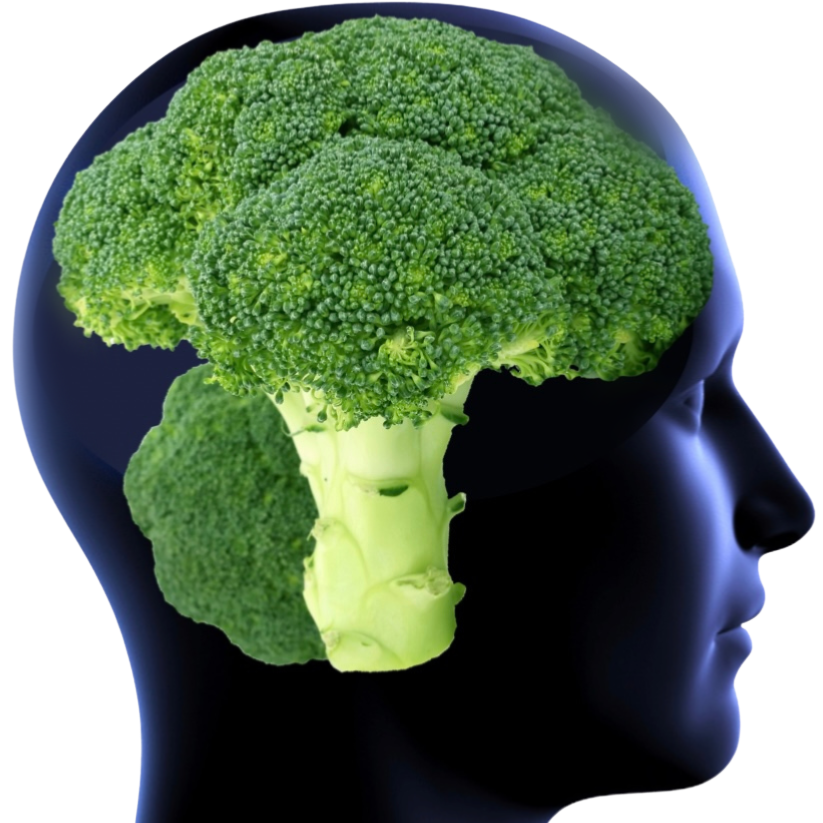My vegetable love should grow
Vaster than empires and more slow
Andrew Marvell
Way back in the 1900s, when I was but a tyke, I used to marvel that a head of broccoli looked like a little tree. Then I noticed that each stalk of that head was like the whole head in miniature and that each floret at the end of a stalk was like the stalk itself. From there I imagined each bud that composed the floret was itself like the floret that was like the stalk that was like the bunch that was like a tree. I wondered then if each bud would have its own stalks, florets, and buds. About this time my revery would be broken by my parents.
“Jimmy! Stop picking at your food.”
I must confess that I had similarly incisive commentary to offer on cauliflower.

What I and so many kids, I’m sure, had stumbled upon was the concept of fractals, geometric shapes, such as the Mandelbrot set (above), that mimic themselves at every level of scale as you zoom in or out: tree, broccoli head, stalk, floret, bud, and so on. Dr. Seuss played with this idea of relative perspective in his classic Horton Hears a Who! in which a speck of dust contains an entire world not unlike our own or, at least, not unlike our own as conceived by Dr. Seuss. For those not familiar with the book, here is a plot synopsis.
An anthropomorphic elephant heeds the demands of voices only he hears and resists his community’s attempts to free him from his delusions before they are all infected.Nothing Is Great or Little
Undoubtedly philosophers are in the right, when they tell us that nothing is great or little otherwise than by comparison.
Jonathan Swift
Broccoli fractals can give us perspective on, well, perspective. How we perceive things in our world is how they are. I have written about how good leaders recognize that everyone’s perception is, in fact, their reality in an essay called the “Introducing the Perception-Reality Razor.”
What we see or accept is what we believe and these beliefs affect our assessments of our experience.
For instance, let’s return to that delicious broccoli I loved to pick at as a boy. When I looked closely at a head of broccoli, I saw a tree. When I zoomed in on a stalk I saw a head. When, I really concentrated, though, that stalk itself grew into a tree or, in a trick of the mind, it could shrink to become a floret in a much bigger head of broccoli. Etcetera, etcetera. Each component of that head of broccoli, fractal-like, could replicate the whole depending on my perspective and my imagination.
Here is another way of thinking about it. If my mom plunked that entire head of steamed broccoli on my plate and then said, “Go ahead. Have at it, boy,” I would have been overwhelmed and a little nauseated. One head of broccoli is much too much for a little boy to eat, but it was perfect for our family. The children’s story of “Goldilocks and the Three Bears” captures this relativity well. If you have forgotten the story, here is a plot synopsis.
A privileged girl breaks into a stranger’s house and raids the kitchen, eventually passing out glutted on a bed only to be discovered by the residents, a family of half-starved beasts returning home to feed.Now, let’s take that whole head of broccoli off that little boy’s plate, where he has been picking at it, and place it in some other contexts.
Picture this scene. In the parking lot of the local supermarket you are loading your groceries into your trunk. A head of broccoli drops to the ground and rolls under the tire of a vehicle driven by a reckless teenager. You would likely be upset at the loss and at your sudden inability to serve broccoli at dinner that night. You can already hear your children’s lament: “Where is the broccoli? You promised us broccoli for dinner. Why did you lie? Why do you always lie?” Many tears and years of expensive family therapy ensue all due to an errant head of broccoli.
Alternate Scene 1: Imagine that same head of broccoli perched precariously at the top of a large pile inside the Mega-Mart Discount Big Box Store and Gift Emporium. Due to a seismic disturbance too slight to be perceived by humans but violent enough to jostle green vegetables, the head of broccoli falls to the floor right into the path of a shopping cart driven by a reckless teenager, mangling the head. The store manager might be irked by the mess but not much concerned at the loss. After all, there is plenty of broccoli in the pile, so the loss of one head is almost immaterial.
Alternate Scene 2: Back at the big Broccoli Distribution Center warehouse number 12 in the Broccoli District of the city, that same head of broccoli falls out of a box only to be smashed by a forklift driven by a reckless teenager. No one notices.
Alternate Scene 3: Farmer Bob’s Small Family Broccoli Plantation and Industrial Agri-Complex™️ stretches as far as the eye can see…
You get my point. The significance of a single head of broccoli varies depending on its context and its observer. For the little boy, it is overwhelming. For the family, the head constitutes a substantial part of dinner. For the grocer, it is just a mess to clean in aisle 1. For the wholesaler, it is merely another stain on the floor among thousands. Etcetera, etcetera.
Same head of broccoli, different contexts, different observers, and different perspectives. In other words, the significance of that head of broccoli varies even if the head of broccoli itself does not.
The same thing happens with our perceptions of ourselves. We can view our accomplishments and our setbacks as big or small simply by reframing the context. If you swing at the softball and miss, you can get upset and storm off the field or you can recognize that one strike alone matters little. If that one strike happens to cost you the game, it may sting more, but in and of itself it is no different than any other strike among many. It’s just a pitch and a swing.
Or how about a more positive result? You connect with the ball and it goes over the fence. You can jog around the bases thinking, not a biggie, just luck. It’s just a pitch and a swing with a happy ending. Or you can feel pride and celebrate, flipping your bat, pumping a fist, and pointing and laughing at the pitcher. The choice is yours. You get to decide if the homerun is a big deal or not, just as with the setback of that single strike. It’s up to you. (By the way, according to behavioral scientist B.J. Fogg, there can be tremendous benefit to celebrating triumphs on the spot although I am not sure even he would advise taunting the pitcher.)
Now let’s consider my plot synopses for Horton Hears a Who! and “Goldilocks.” They were inspired by my favorite plot synopsis of all time:
“Transported to a surreal landscape, a young girl kills the first person she meets and then teams up with three strangers to kill again.“This, as you know, is the plot of The Wizard of Oz. Here is my plot synopsis of another famous movie:
Henry has it all — his glamorous dream career, the respect of his peers, money, women, and power — but will he give it up for a quiet life of anonymity with the woman he loves? Set to a classic rock soundtrack.All these synopses are factually accurate, but all are also slyly misleading. We can make children’s stories seem ominous, make a beloved movie classic sound brutal, or turn a brutal gangster movie like Goodfellas into a romantic comedy simply through word choice, selective omission, and shifting emphases. After all, who can deny that the action of “Goldilocks” revolves around a burglary gone wrong?
In short, our perceptions are all relative and are, therefore, relatively within our control. I can celebrate a tiny achievement and dismiss a major failure. I can accept others’ judgments or make my own assessments because these things are not big or small or good or bad or scary or funny in and of themselves. Their impact is ultimately up to me, how I receive them, and how I perceive them.
Undoubtedly philosophers are in the right, when they tell us that no head of broccoli is great or little otherwise than by comparison.
How does your perception shape your self-awareness? How does your self-awareness shape your actions?
You can choose your perceptions, your reactions, and your behavior in order to better navigate your life, and I can help. Click below for your free consultation.
Share your thoughts on this topic or participate in a discussion by leaving a comment below or by contacting me directly by email:
You’ll have to register with Substack and sign in to leave a comment, which is painless and free.
Please share this post on social media.
And don’t forget to click subscribe to have Tools+Paradigms sent directly to your inbox. I look forward to hearing from you.
Opening and closing podcast theme music by LiteSaturation from Pixabay.

















Share this post